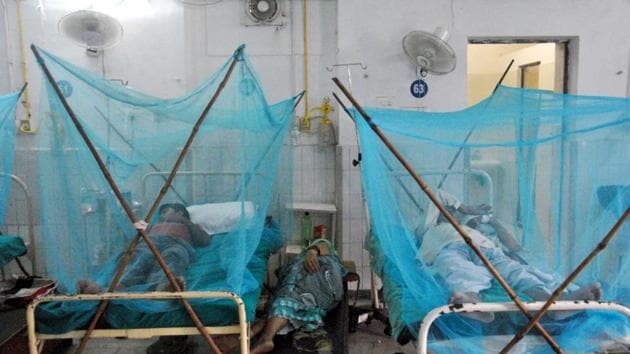Uttarakhand health department gears up to check spreading of dengue
A 58-year-old man working at a paper mill in Lalkua, Haldwani was diagnosed with dengue on Monday, bringing the total number of such cases in the state this year to four. Earlier, two cases have been reported from Nainital district, one from Udham Singh Nagar.
A 58-year-old man working at a paper mill in Lalkua, Haldwani was diagnosed with dengue on Monday, bringing the total number of such cases in the state this year to four. Earlier, two cases have been reported from Nainital district, one from Udham Singh Nagar.

The health department, however, said it was gearing up to check spreading of disease in the state, with it’s focus on creating awareness about the disease among the people.
Monsoon rains provide more breeding grounds for mosquito that carries the dengue virus. In India, dengue cases usually peak during and just after the rainy season that normally lasts from June to September.
Health department officials say the key to this is community participation.
“Dengue is caused by aedes mosquito which breeds inside people’s homes. It is not like malaria. The mosquito breeds in water collected in containers, flower vases and other places. Until and unless people do not clean their houses, it becomes difficult to control the disease,” said Dr Pankaj Singh.
Dr Singh is the nodal officer of vector borne diseases and assistant director of integrated disease surveillance programme (IDSP).
In order to increase awareness about the disease, the department has come up with an IEC strategy – information, education, communication.
“We have been utilising Asha workers to help us in this exercise. They have been going door to door since April and informing people to remove water from coolers, flower pots, rubber tyres and other places so that the mosquito doesn’t lay its eggs there. They also check people’s houses to ensure there is no stagnant water,” Singh said.
“This is highly beneficial as with a decrease in density of larva, the chances of an outbreak are also reduced,” he said.
The department is also carrying out IEC activities through the social media. Taking it a step further, the department has decided to involve children from both government and private schools as a part of the process.
“We will be providing the children with a dengue homework card. This is a four-month-long task where the students will monitor their surroundings and make a note of the places in which mosquitoes are breeding. This will be overlooked by their parents or guardians,” Singh said.
This will help in spreading education and awareness to the whole family, he added.
The department has identified Dehradun, Haridwar, Nainital, Udham Singh Nagar and some plains in Pauri and Tehri as areas sensitive to the outbreak of the disease.
With 2,046 cases, including four deaths, Uttarakhand accounted for 1.82 percent of the total cases of dengue reported in the country in 2016. Last year, this number came down to 849.
As per the department, seven hospitals in the state are equipped with testing labs for dengue. “We administer the Elisa test to patients free of cost in these hospitals,” Singh said.
While Doon Medical College and Coronation Hospital in Dehradun are equipped with these testing labs, two hospitals in Nainital, and one each in Haridwar, Udham Singh Nagar and Srinagar also offer the facility.
The health department has declared dengue a notifiable disease, which means that if any private or government hospital receives a patient afflicted with dengue, it is the hospital’s responsibility to notify the government immediately.
“As soon as we get any information, we identify that area and then carry out source reduction, IEC, fumigation and other activities there so that the infection gets contained in that area,” Singh said.
“We are also creating dengue isolation wards in all major government hospitals across the state. All the beds in these wards are covered with mosquito nets and special precautions are taken with regard to the cleanliness and hygiene of the area,” Singh said.
The health department has also partnered with other departments to ensure that the effects of the disease can be minimised, Singh said. Detailed information about dengue can also be obtained through integrated helpline number 104, he added.






